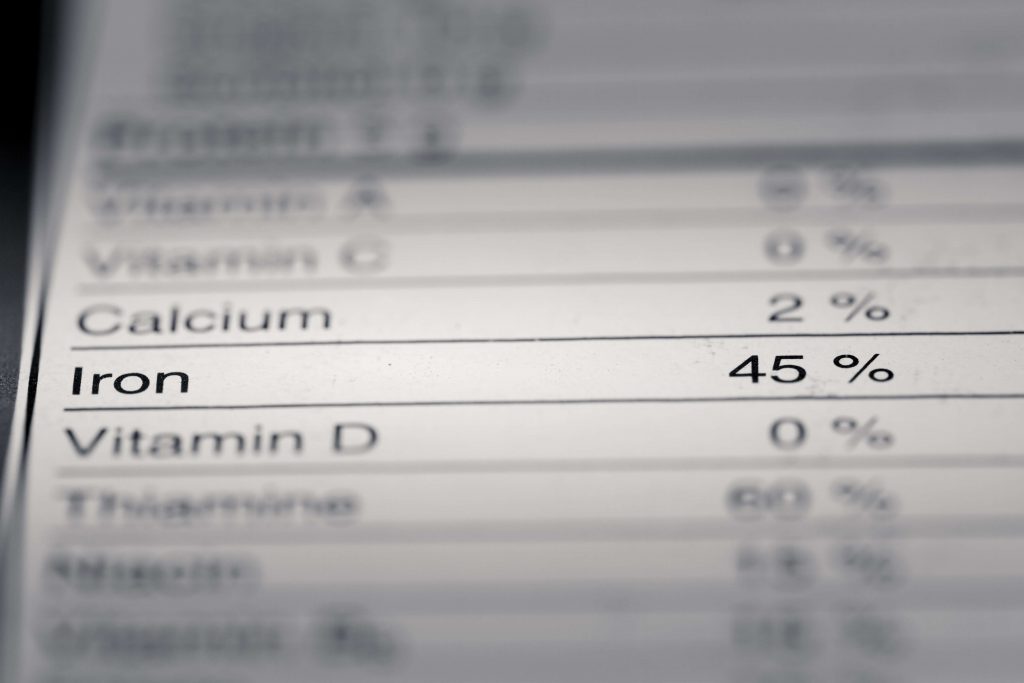News & Updates
Iron Deficiency in Adults – What you need to know
Sufficient levels of iron are paramount for the proper functioning of all cells within the body. The primary role of iron is that it aids in the transportation of oxygen to the body’s cells and tissues. In the red blood cells, iron combines with a protein called haemoglobin. When we breathe in, the oxygen within our lungs is attracted to the iron in haemoglobin, and it combines with it to form oxyhaemogloblin. Thus, oxygen can be transported throughout the body by red blood cells, releasing wherever it is needed.
Additionally, iron is involved in other bodily functions, such as fighting viruses and diseases within the immune system, brain function, and muscle strength.
What is Iron Deficiency?
Iron deficiency in Australia has risen to become one of the most common health problems identified. Having an insufficient amount of iron in the body can cause a general lack of energy and lethargy. Without intervention, an individual whose dietary intake of iron is inadequate to meet their body’s needs will eventually deplete their iron stores and as a result, they will develop iron deficiency anaemia. Iron deficiency anaemia occurs when the body’s iron stores get so low that there is not enough iron to make adequate amounts of haemoglobin.
Causes of Iron Deficiency
If an individual is not consuming enough iron or losing too much of it, the body cannot produce adequate amounts of haemoglobin, eventually resulting in an iron deficiency.
When an iron deficiency is detected, it is important to find the cause of it. The most common causes of iron deficiency are inadequate iron intake, chronic blood loss, poor absorption of iron, and the body’s increased need.
- Inadequate Dietary Intake
The body regularly gets iron from the foods you consume. Individuals who follow a restricted eating pattern, such as a vegetarian or vegan diet, pose a higher risk of iron deficiency. If meat is not a part of your diet, you may need to increase your intake of iron-rich, plant-based foods to absorb the same amount of iron as someone who does consume meat. Notably, the body absorbs more iron from red meat, pork and poultry than it does from any other food source.
- Blood Loss
Situations of blood loss such as heavy menstrual periods, regular blood donation, regular nosebleeds, and chronic disorders such as peptic ulcers and bowel cancer can cause iron deficiency anaemia. This makes women and teenage girls with heavy periods at a higher risk of developing an iron deficiency.
- Poor Absorption of Iron
A healthy adolescent absorbs around ten to fifteen per cent of iron from their dietary intake, however certain individuals are unable to absorb and utilise the iron from their food.
Additionally, previous stomach surgery, untreated coeliac disease, and inflammatory bowel diseases prevent adequate iron absorption into the body.
4. Body’s Increased Need
Rapidly growing children and pregnant women are high risk individuals of iron deficiency because of their body’s drastic increase in the need for iron. If this heightened need is not met, an iron deficiency can rapidly occur.
There is a particular emphasis on the risk to pregnant women, as their iron stores change to serve their increased blood volume, as well as be a source of haemoglobin for their growing foetus.
Treatment for Iron Deficiency
An iron deficiency can be treated by adding iron supplements and iron-rich foods into your diet. However, you should only take iron supplements if you have been professionally diagnosed with an iron deficiency. Taking iron supplements if you are run down will not help unless you have been professionally diagnosed with an iron deficiency.
Generally, iron supplements may need to be taken for 3 to 6 months to properly replenish your body’s iron stores. This may vary depending on the severity of iron deficiency of the individual.
Notably, excessive iron accumulation in the body from taking large amounts of iron supplements can be damaging to your liver at high doses and cause other complications in the body.
Prevention
To reduce your risk of iron deficiency, be mindful to add iron-rich foods into your diet. These include:
- Red Meat, Pork & Poultry
- Seafood
- Beans
- Dark Leafy Green Vegetables (e.g. Spinach)
- Dried Fruits (e.g. Raisins, Apricots)
- Iron-Fortified Cereals, Breads & Pastas
- Peas
- Vitamin C (increases iron absorption)
Diagnosis for Iron Deficiency
If you suspect you may have an iron deficiency, the Iron Status Screen Test will measure the iron levels within your blood, as well as the level of iron that is stored in your body. This at-home test can be used to identify iron deficiency anaemia, as well as to monitor and manage an existing iron deficiency.
We highly recommend to order this test if you experience the following symptoms:
- Extreme Fatigue
- Weakness or Dizziness
- Shortness of Breath
- Chest Pain
- Heart Palpitations
- Pale Skin
- Cold Hands & Feet
- Inflammation or Soreness of Tongue
- Follow a Vegetarian or Vegan Diet


